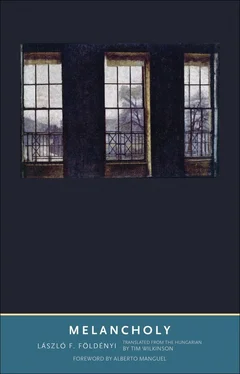The modern melancholic was not in any way the perfect human that Ficino and the Renaissance interpretation took him for. He was a mundane, earthly creature who was melancholic not because of a yearning for perfection but because of the reality of the imperfection that exists. “One of the most effective reflections for hardening ourselves against our misfortunes,” writes Montesquieu, “is reflection on the immensity of things and the pettiness of the sphere we inhabit” (Montesquieu, My Thoughts , 22). Existence may be imperfect, but not in the medieval sense: the emphasis is not on the distance from divine perfection but on the limitations of man. The world seems intolerable because his capabilities are finite, professes the modern melancholic. It is not hard to spot the change in emphasis: Renaissance melancholia was prompted by the attempt to create a new world, whereas its modern counterpart was based on the melancholic’s being shut up in himself. Man is hamstrung by extant things, and this is what makes him melancholic: he is aware of perfection but is unable to extricate himself from a state of imperfection. In his article under the heading “Mélancolie” in L’Encyclopédie , Denis Diderot wrote, among other things, the following: “The cause of melancholia is a habitual feeling of our imperfection. . It is most often a consequence of weakness of the soul and the organs. It can also be a product of ideas about a certain perfection that is not found either in ourselves or in others, in the objects of our pleasure or in nature” ( Encyclopédie ou Dictionnaire raisonné des sciences, des arts et des métiers , 10:307). Melancholia “swoops down” on man; it is not a matter of him going out to meet it. The melancholic is resigned to his imperfection from the outset; and since that imperfection is not just in his mind but deadly real, melancholia cannot be prevailed upon to cease by sheer force of insight or arguments. Ideological judges of melancholia (can a nonmelancholic be anything else?) ignore precisely that reality; the melancholic is the way he is not through his own will but because of the starkest reality of his life. There is a conspicuously great lack of understanding between bourgeois ideologues who censure melancholia, and melancholics themselves: there is no contact between the mostly trite, generalizing judgments of the former group and the uncommunicative, taciturn personalities of the latter. In a work entitled Historia critica philosophiae (1742–44), Jakob Brucker condemned melancholics and made not the slightest effort to understand melancholia, the furor fanaticus . In a book that appeared in 1777 with the title Versuch über die Temperamente , Heinrich Wilhelm Lawätz likewise interpreted the condition in a typically absolutist fashion: “Usually the people who are victims of the most dreadful horrors of melancholia are those who view all human deeds gloomily, ungraciously, and with inherent malice against the world and people, each and every one to the root, and they go astray in this truly dreadful maze to the point that no human wisdom is able to guide them out of there any longer” (67). The melancholic, who, in Lawätz’s view, was inherently rebellious , would most likely have been baffled by reading these words, which were not applicable to him but to an imaginary phantom constructed by public opinion in order to offer an easy proof of its unviability. The “ideological parenthesis” is the most convenient procedure imaginable: it makes it superfluous to understand psychological states (even mental disturbances) that deviate from the average and the ordinary in relation to their own internal interpretation of existence, and it implicitly denies that melancholics and nonmelancholics live in a shared world. These ideologues, instead of acknowledging that the reason a melancholic sees the world of other people the way he does is because this world really does lend itself to such a different viewing, deny that the world is contradictory and paradoxical, and by making reference to Hegel, they assert that whoever looks upon the world irrationally is also presenting an irrational aspect to the world. But those who behave that way fail to pose a simple question: how is it possible to look irrationally upon the world? And instead of admitting that irrationality is an essential part of the world, they maintain that whoever looks upon the world irrationally has only himself to blame because the fault lies exclusively in him. That presupposes that whoever looks irrationally upon a rational world is actually not even part of that world , and his irrational way of looking at things — given that he has nothing in common with the world (with existence) — is not really genuine; it is nonexisting. The ideological parenthesis on this occasion, as ever, not only destroys thoughts but also sees even solid, flesh-and-blood individuals as nonexistent. Whenever public opinion encounters any unusual, extraordinary behavior or interpretation of existence, nothing seems simpler than to dismiss them with a wave of the hand. Montesquieu, referring to an earlier train of thought, wrote in one of his letters: “Day after day I think again of this profound silence, of solitude, in which I converse merely with my pains and my deep melancholy” (quoted in Fritz Schalk, “Diderots Artikel ‘Mélancolie’ in der Enzyklopädie,” 180).
The world is not on speaking terms with the melancholic, which immerses the latter even more deeply in his melancholia. “A melancholic flees from society and only feels all right alone,” Diderot wrote in 1765—good-naturedly, it is true, but simplifying the problem (quoted in Schalk, “Diderots Artikel ‘Mélancolie’ in der Enzyklopädie,” 182). The melancholic does indeed flee, but he does so because he is persecuted. Being ignored, he becomes isolated and solitary (he can count on himself only—  , as the Greek has it, a private person); yet in following the command of the most elementary vital instinct, he tries to prove that he most certainly does exist, and his feelings and thoughts are not illusions but are real and solidly grounded. From the eighteenth century onward, the melancholic has been singled out by loneliness and a compulsion for self-justification . The sentimentality that the modern era associates with melancholia is not pure affectation, but a self-indulgence of the melancholic personality, an inward-looking self-justification derived from isolation. The word “sentimental” began to spread in England from the 1740s: Thomas Warton published in 1747 what is still his most famous poem, “The Pleasures of Melancholy,” following the success of Edward Young’s The Complaint; or, Night Thoughts on Life, Death, and Immortality (1742–45), in which he observed links between loneliness, pleasure , and suffering . In France, the Jesuit Dictionnaire de Trévoux , which first appeared in 1734 (that is, well before Diderot’s article in L’Encyclopédie ) coupled melancholia not just with sadness but also with pleasure ( un certain triste plaisir ) and called it a satisfying form of daydreaming ( une rêverie agréable ). The usual place of the verb songer had by then been taken over in the context of melancholia by rêver , with its more personal connotations, to the point that in the eighteenth century “daydreamer” and “melancholic” had virtually become synonyms. 26In spite of all its negative side effects, Diderot called melancholia a “sweet feeling” ( sentiment doux ) that had the merit of allowing one to enjoy oneself when in that state, and to be aware of oneself. Sweet, sentimental melancholia became a platitude, even a pose, in the eighteenth century 27—nevertheless, sentiment and sentimentality, while becoming a fashionable norm to be observed, did not conceal from the inward gaze the by-no-means-painless gesture of self-justification. Of course, that in itself became a kind of trap, and things that were painful to contemplate inwardly appeared to the outside world as pleasant sentimentality. If one shuts one’s eyes to the attempts at self-justification, then all that remains is what one can relate to oneself: a feeling that in itself is harmless and puts one under no obligation. But if one genuinely enters the world of the melancholic, then one will discover something beyond feelings — the sort of thing about which the Hungarian poet Dániel Berzsenyi could write in 1820: “My soul died long ago, and its place was occupied by a new, unknown soul, which is dark and cold, like the sky, and tranquil as a grave” (Berzsenyi, Összes művei , 430).
, as the Greek has it, a private person); yet in following the command of the most elementary vital instinct, he tries to prove that he most certainly does exist, and his feelings and thoughts are not illusions but are real and solidly grounded. From the eighteenth century onward, the melancholic has been singled out by loneliness and a compulsion for self-justification . The sentimentality that the modern era associates with melancholia is not pure affectation, but a self-indulgence of the melancholic personality, an inward-looking self-justification derived from isolation. The word “sentimental” began to spread in England from the 1740s: Thomas Warton published in 1747 what is still his most famous poem, “The Pleasures of Melancholy,” following the success of Edward Young’s The Complaint; or, Night Thoughts on Life, Death, and Immortality (1742–45), in which he observed links between loneliness, pleasure , and suffering . In France, the Jesuit Dictionnaire de Trévoux , which first appeared in 1734 (that is, well before Diderot’s article in L’Encyclopédie ) coupled melancholia not just with sadness but also with pleasure ( un certain triste plaisir ) and called it a satisfying form of daydreaming ( une rêverie agréable ). The usual place of the verb songer had by then been taken over in the context of melancholia by rêver , with its more personal connotations, to the point that in the eighteenth century “daydreamer” and “melancholic” had virtually become synonyms. 26In spite of all its negative side effects, Diderot called melancholia a “sweet feeling” ( sentiment doux ) that had the merit of allowing one to enjoy oneself when in that state, and to be aware of oneself. Sweet, sentimental melancholia became a platitude, even a pose, in the eighteenth century 27—nevertheless, sentiment and sentimentality, while becoming a fashionable norm to be observed, did not conceal from the inward gaze the by-no-means-painless gesture of self-justification. Of course, that in itself became a kind of trap, and things that were painful to contemplate inwardly appeared to the outside world as pleasant sentimentality. If one shuts one’s eyes to the attempts at self-justification, then all that remains is what one can relate to oneself: a feeling that in itself is harmless and puts one under no obligation. But if one genuinely enters the world of the melancholic, then one will discover something beyond feelings — the sort of thing about which the Hungarian poet Dániel Berzsenyi could write in 1820: “My soul died long ago, and its place was occupied by a new, unknown soul, which is dark and cold, like the sky, and tranquil as a grave” (Berzsenyi, Összes művei , 430).
Читать дальше

 , as the Greek has it, a private person); yet in following the command of the most elementary vital instinct, he tries to prove that he most certainly does exist, and his feelings and thoughts are not illusions but are real and solidly grounded. From the eighteenth century onward, the melancholic has been singled out by loneliness and a compulsion for self-justification . The sentimentality that the modern era associates with melancholia is not pure affectation, but a self-indulgence of the melancholic personality, an inward-looking self-justification derived from isolation. The word “sentimental” began to spread in England from the 1740s: Thomas Warton published in 1747 what is still his most famous poem, “The Pleasures of Melancholy,” following the success of Edward Young’s The Complaint; or, Night Thoughts on Life, Death, and Immortality (1742–45), in which he observed links between loneliness, pleasure , and suffering . In France, the Jesuit Dictionnaire de Trévoux , which first appeared in 1734 (that is, well before Diderot’s article in L’Encyclopédie ) coupled melancholia not just with sadness but also with pleasure ( un certain triste plaisir ) and called it a satisfying form of daydreaming ( une rêverie agréable ). The usual place of the verb songer had by then been taken over in the context of melancholia by rêver , with its more personal connotations, to the point that in the eighteenth century “daydreamer” and “melancholic” had virtually become synonyms. 26In spite of all its negative side effects, Diderot called melancholia a “sweet feeling” ( sentiment doux ) that had the merit of allowing one to enjoy oneself when in that state, and to be aware of oneself. Sweet, sentimental melancholia became a platitude, even a pose, in the eighteenth century 27—nevertheless, sentiment and sentimentality, while becoming a fashionable norm to be observed, did not conceal from the inward gaze the by-no-means-painless gesture of self-justification. Of course, that in itself became a kind of trap, and things that were painful to contemplate inwardly appeared to the outside world as pleasant sentimentality. If one shuts one’s eyes to the attempts at self-justification, then all that remains is what one can relate to oneself: a feeling that in itself is harmless and puts one under no obligation. But if one genuinely enters the world of the melancholic, then one will discover something beyond feelings — the sort of thing about which the Hungarian poet Dániel Berzsenyi could write in 1820: “My soul died long ago, and its place was occupied by a new, unknown soul, which is dark and cold, like the sky, and tranquil as a grave” (Berzsenyi, Összes művei , 430).
, as the Greek has it, a private person); yet in following the command of the most elementary vital instinct, he tries to prove that he most certainly does exist, and his feelings and thoughts are not illusions but are real and solidly grounded. From the eighteenth century onward, the melancholic has been singled out by loneliness and a compulsion for self-justification . The sentimentality that the modern era associates with melancholia is not pure affectation, but a self-indulgence of the melancholic personality, an inward-looking self-justification derived from isolation. The word “sentimental” began to spread in England from the 1740s: Thomas Warton published in 1747 what is still his most famous poem, “The Pleasures of Melancholy,” following the success of Edward Young’s The Complaint; or, Night Thoughts on Life, Death, and Immortality (1742–45), in which he observed links between loneliness, pleasure , and suffering . In France, the Jesuit Dictionnaire de Trévoux , which first appeared in 1734 (that is, well before Diderot’s article in L’Encyclopédie ) coupled melancholia not just with sadness but also with pleasure ( un certain triste plaisir ) and called it a satisfying form of daydreaming ( une rêverie agréable ). The usual place of the verb songer had by then been taken over in the context of melancholia by rêver , with its more personal connotations, to the point that in the eighteenth century “daydreamer” and “melancholic” had virtually become synonyms. 26In spite of all its negative side effects, Diderot called melancholia a “sweet feeling” ( sentiment doux ) that had the merit of allowing one to enjoy oneself when in that state, and to be aware of oneself. Sweet, sentimental melancholia became a platitude, even a pose, in the eighteenth century 27—nevertheless, sentiment and sentimentality, while becoming a fashionable norm to be observed, did not conceal from the inward gaze the by-no-means-painless gesture of self-justification. Of course, that in itself became a kind of trap, and things that were painful to contemplate inwardly appeared to the outside world as pleasant sentimentality. If one shuts one’s eyes to the attempts at self-justification, then all that remains is what one can relate to oneself: a feeling that in itself is harmless and puts one under no obligation. But if one genuinely enters the world of the melancholic, then one will discover something beyond feelings — the sort of thing about which the Hungarian poet Dániel Berzsenyi could write in 1820: “My soul died long ago, and its place was occupied by a new, unknown soul, which is dark and cold, like the sky, and tranquil as a grave” (Berzsenyi, Összes művei , 430).










